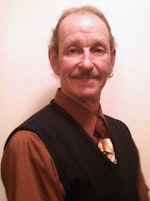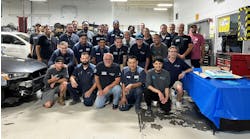Outspoken entrepreneur succeeds by stressing excellence and value
Operating on a mostly cash-based system, each of the seven locations resemble luxury hotels, where serving guests' needs is a priority. In fact, G&C's customers are called guests.
If these attributes strike anyone as being high in overhead, they're offset by a steady flow of referral-based business – 90 percent is driven by participating in 14 direct repair programs (DRPs), totaling $22 million a year in revenue.
"Most insurance companies refer work if it's a quality-run shop, the price is fair and you make a good impression," Crozat says. "I'm not in the auto reconstruction business, I'm in the people pleasing business. You never get a second chance to make a first impression, and impression is important. Our goal is to wow the customer. More customers are women today, and they would like a nice place."
Floors of marble, roofs of Italian tile and even a jukebox gracing an exquisitely appointed lobby are examples of amenities. The same concept is applied when dealing with insurers, suppliers and anyone else.
"If you combine a Bellagio image with keeping costs per claims down while keeping stellar cycle time and provide great customer service, every company will want to work with you," Crozat says. "Performance matches the look; we want our work to surpass our image. I hire the best people and buy state-of-the-art equipment."
Cash is king
A policy of paying cash on the barrelhead enhances the process. Spending $150,000 a month on paint, the ability to introduce cash immediately into transactions augments values obtained through volume purchasing.
"I get great deals because no one else is paying promptly," Crozat says. "Elsewhere, cars sit in back for 10 days because they can't afford the parts."
Hunting down and taking advantage of bargains that may not be apparent to others is a Crozat specialty. Installing solar panels atop the shop in Windsor resulted in an $84,000 energy savings rebate plus nonexistent electric bills.
"One hundred percent of the power to run that store is all solar," he says. "It pays to go solar."
Crozat took out a loan to partially fund construction of the $8-million facility, and that, too, generated savings with a 20-year interest rate below 5 percent through the U.S. Small Business Administration. The shop in Windsor is along the freeway, and there are no other body shops in town.
"Shops are going broke all over the place," Crozat says. "A shop that used to sell for $1 million is selling for $300,000."
Promoting the business
Advertising is another avenue for gleaning the most out of a comparatively meager investment. G&C markets itself heavily with two full-time public relations professionals, a pattern of high-profile charitable contributions to worthy causes, and a media package that includes airing spots on seven radio stations and running a steady slate of commercials on cable television.
Ad rates are cheap in a poor economy, especially when paying cash upfront. Crozat can't understand why every body shop isn't taking advantage of this opportunity. "For less than the price of a McDonald's cheeseburger, I can reach thousands of customers on cable TV, yet nobody else is advertising," he says.
"I have more replacement cars than Enterprise," he says, describing the fleet of 100 vehicles bearing prominent G&C signage that are available onsite.
The cars, all newer models, were bought in bulk at a bargain. They pay for themselves while promoting the shop's reputation for convenience, excellence and value.
"Guests get replacement cars in five minutes," Crozat says. "If I owned a mortuary, I'd own the flower shop next door."
Remaining independent
Repair operations are unusually structured, too. Most paint and body specialists are independent contractors.
"I rent them the stalls, and they can come and go as they please," Crozat says.
"They make way more money than if they were employees," Crozat says. "I don't have to hold their hand, and I don't have a high turnover rate because they can't make as much money anywhere else."
Although such a setup would seem to invite conflict about the pace of individual production, the result is contrary. Workers are motivated because they're working for themselves rather than watching the clock in anticipation of quitting time.
"The bodymen are brown-nosing the painters, and the painters are brown-nosing the bodymen because they know they need to cross the finish line by Friday," he says.
Alayne Saturday, Crozat's assistant for 23 years, recounts a worker who used to have an eight-hour day, but now he can stay until 5:30 while his wife can be a stay-at-home mom. That notion is confirmed by independent contractor Joe Lippard, owner of Lippard Enterprises.
"It's a win-win for both of us," he says. "I have one customer to deal with, and that's G&C Autobody."
Lippard has had as many as six people working for him within the facility, where he rents two stalls. Some crews work day and night on big jobs.
"I never want to work hourly again," says Lippard, acknowledging he grosses $4,000 to $6,000 a week.
Satisfied customers
Managers and estimators who deal directly with the public are awarded bonuses based on customer satisfaction scores that must be 9.5 on a scale of 10 to be eligible.
"We needed to improve customer service," says Crozat's son Shawn. "Managers were looking at the bottom line too much and not on serving guests."
Presenting a top-notch facility is paramount to making G&C successful.
"It's expensive but worth it," Shawn Crozat says. "It brings us the business."
Fighting for what's right
Through the years, Gene Crozat has been in a series of bruising public battles with state insurance commissioners, insurance companies and others in the profession. For a long time, G&C was relentless in assisting customers by helping them take carriers to small claims court over alleged reimbursement shortages. Cases filed and won numbered in the hundreds.
"It was always a matter of principle to me, Gene Crozat says. "It's never been about the money. We don't have that problem anymore. My rate has been paid, we have a deal via DRP agreements, and my customers are satisfied. This is finally a nonissue. We made our peace."
G&C wants to exceed all insurance partners' key profit indicators, and its insurance partners want the most competitive price, best service as well as the lowest cycle time. "We consistently give our insurance partners these things in all of our locations," Gene Crozat says.
The elder Crozat was instrumental in establishing the Collision Repair Association of California after becoming dissatisfied with the California Autobody Association.
"I've addressed the wrongs that were affecting our industry," he says. "I've never been afraid to take on the issues in front of the California State Legislature or in the boardrooms of the insurance carriers."
Formerly fierce insurance industry antagonists are now partners carrying out the business of repairing cars.
"It's like in school, if you ever got into a fight with a bully – after it's over, you have a respect for each other," Gene Crozat says.
But the industry still needs to work harder on building a tough, united front, according to Gene Crozat. Shops shouldn't hate each other; instead they should tweak each area of their business and talk to other shops.
Passing lessons down
Gene Crozat is appreciative of his own mentors, including Leonard Rich of Rich's AutoBody in Merced, Calif., and Jack Dennis, claims manager for the California State Automobile Association. Dennis believed in Gene Crozat when he first started running his own shop, and the 78-year-old Leonard, who still goes to the shop every day, taught Crozat how to paint and match colors by hand.
"Those lessons are constantly being taught to our painters today, and because of them, we can guarantee our paint jobs for 100 years," Gene Crozat says. "We are known as color-matching specialists."



